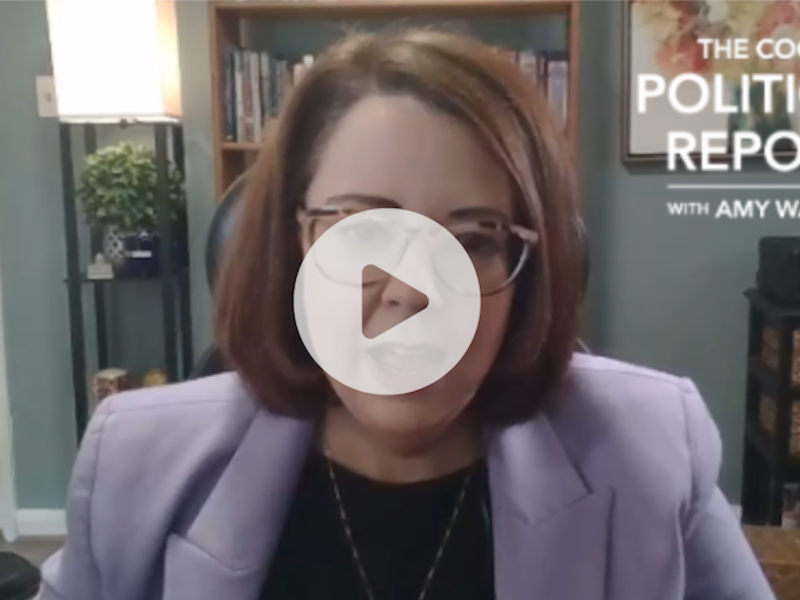
As we wrote a few weeks back, by the numbers, the California recall effort that culminates tomorrow should have little chance of success. Democrats have a huge registration advantage. Gov. Gavin Newsom is relatively (though not overwhelmingly) popular. The “No” side has a huge cash advantage. The one thing that the “Yes” side did have earlier this summer was the political winds at their back. The Delta variant combined with wildfires and continuing frustrations over homelessness, crime and economic security put Newsom on the defensive. It also helped to energize the GOP base. Meanwhile, without a Trump in the White House to stir Democratic angst/passions, there was little motivation for Democratic voters to pay attention to the recall effort.
But now, Democrats have made Republican replacement candidate Larry Elder into the electoral boogeyman/Trump replacement they need — with a huge assist from the conservative radio host himself at times — and Newsom is now the clear favorite to survive, perhaps by a wide margin that seemed unlikely even a few weeks ago. As such, we are moving our final rating of this race back from Lean Democrat to Likely Democrat.
Our initial shift of our ratings came because polling over the summer showed a big enthusiasm gap. There was also grumbling by many Democrats in the state that the Newsom campaign wasn’t taking the recall seriously enough and had given the “Yes” on recall forces an unnecessarily helpful head start. Even so, the numbers were there for Newsom to survive. Unlike Gray Davis in 2003, polling across the board showed that Democrats were universally opposed to the recall (this wasn’t the case in 2003), and independent voters were only slightly more supportive of the recall than not. The solution to Democrats’ math problem was simple: turn out their voters.
And, as of Monday morning, they have. According to PoliData (run by data guru Paul Mitchell), more than 7.7 million ballots have already been cast, and 52 percent of them (4 million) were from Democrats. Meanwhile, Republicans have turned out at almost the same rate as Democrats (39 percent of Democrats have sent in their ballots compared to 36 percent of Republicans). But, because Republicans are such a smaller share of the electorate, that only totals 1.9 million. Another 1.7 million independent voters have returned their ballots.
Even in a best-case scenario for the “Yes” on recall - that only 80 percent of Democrats oppose the recall, 90 percent of Republicans and 60 percent of Independents vote YES - that still would only get the Yes side to 2.7 million while the NO side would be at 3.8 million.
However, as we learned in 2020, the early vote can be misleading, especially since so many more Democrats voted by mail and Republicans voted in person.
While this is primarily a vote-by-mail contest, ballots can also be cast in person. Last weekend was the first opportunity to do so. Mail-in ballots can also be returned on Election Day. We suspect that the pattern begun in 2020 — with more GOPers casting votes in person and more Democrats casting them by mail, will continue into this election. Even so, given the big lead already banked by Democrats, even a decisive Election Day/in-person vote is not likely to be enough.
The polling bears out a shift over the past few weeks as well. As of Sunday evening, the FiveThirtyEight average gives Newsom a 14.7 point margin average to survive the recall, with 56.2 percent voting to keep him and 44.6 to remove. A month ago, the polls showed the recall deadlocked, and on Aug. 24 — right before the data started overwhelmingly breaking away for Newsom, he only had a 1.2 point lead in the average of polls. The Institute of Governmental Studies at the University of California-Berkeley’s final pre-recall poll released Friday (conducted Aug. 30-Sept. 6, 6,550 LVs) found 60.1 percent would vote no while just 38.5 planned or had already voted yes on recall. In the IGS’s late July poll, the race was a statistical tie, at 50 percent to 47 percent for a narrow “No” edge. Notably, the September poll found a huge spike in Democrats and independents who said they planned to vote — Democrats jumped from 58 percent to 80 percent, and independents went from 55 percent to 70 percent — in just over a month. Republican enthusiasm remained stable, with only a 4 point uptick from 87 percent to 91 percent.
What helped get Democrats motivated? Elder is likely the biggest reason as his controversial and conservative views on several issues already put him out of step with this deep blue state. But, it was his opposition to vaccine and masking mandates that allowed Newsom to change the narrative — focus more on what Elder was doing wrong than on the terrible Delta summer and the French Laundry incident. Plus, Edler gave Newsom huge gifts in showing exactly how he’d govern differently from the Democratic incumbent — and out of step with the vast majority of the state. None such incident seemed worse than just over a week ago when Elder said on Mark Levin’s radio show that the state’s 88-year-old senior Senator Dianne Feinsten was in “even worse mental condition than Joe Biden and that “they’re afraid I’m going to replace her with a Republican — which I most certainly would do. And that would be an earthquake in Washington, D.C.”
It wouldn’t just be an earthquake if something happened to Feinstein and Elder replaced her with a Republican — it would quite literally tip the balance of power back to the GOP in the Senate. Elder’s also suggested he’d seek to limit legal abortion in the state, which has also ginned up once complacent voters on the heels of the Texas law. Elder has also faced allegations of past sexual harassment (which he denied but then said one woman was not attractive enough to have been harassed).
With Elder emerging as the clear frontrunner should Newsom be recalled — even though he’d only win with a plurality of the vote around 20 percent or so among the 46 candidates listed under Question 2 — even recall organizers say his surge, due to his celebrity among very conservative circles, has been counterproductive. “I rejected his candidacy from the get-go because he’s so far outspoken on the extreme,’’ recall campaign leader Orrin Heatlie told Politico last week. If another more moderate candidate such as former San Diego Mayor Kevin Faulconer had emerged as the consensus Republican candidate instead, it would have given anti-recall forces a far more persuasive contrast to make and may not have animated Democrats to vote as much. Recall advocates needed this to be a referendum on Newsom — quite literally what a recall election is, by definition. Instead, in the final weeks, it’s been one on Elder.
As such, Newsom looks headed for clear victory on Tuesday (though with mail-in ballots, don’t necessarily expect to know quickly). Our final rating is Likely Democrat.










Subscribe Today
Our subscribers have first access to individual race pages for each House, Senate and Governors race, which will include race ratings (each race is rated on a seven-point scale) and a narrative analysis pertaining to that race.